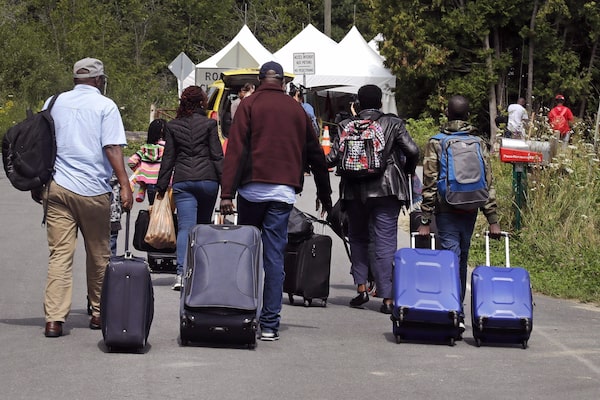
A family from Haiti approaches a tent in Saint-Bernard-de-Lacolle, Que., on Aug. 7, 2017.Charles Krupa/The Associated Press
Ottawa is appealing a court ruling that struck down a key agreement on refugees between Canada and the United States, Public Safety Minister Bill Blair said Friday.
The Federal Court of Canada ruled last month that elements of the law underpinning the pact violate the constitutional guarantee of life, liberty and security.
The declaration of invalidity was suspended for six months, leaving the law in place until mid-January.
Under the Safe Third Country Agreement, which took effect in 2004, Canada and the U.S. recognize each other as safe places to seek protection.
It means Canada can turn back potential refugees who arrive at land ports of entry along the Canada-U.S. border on the basis they must pursue their claims in the U.S., the country where they first arrived.
In a statement, Mr. Blair said Friday there are factual and legal errors in some of the Federal Court’s key findings. “There are important legal principles to be determined in this case, and it is the responsibility of the Government of Canada to appeal to ensure clarity on the legal framework governing asylum law.”
Canadian refugee advocates have firmly opposed the deal, arguing the U.S. is not always a safe country for people fleeing persecution.
Several refugee claimants took the case to court along with the Canadian Council for Refugees, the Canadian Council of Churches and Amnesty International, which participated in the proceedings as public interest parties.
In each case, the applicants, who are citizens of El Salvador, Ethiopia and Syria, arrived at a Canadian land entry port from the U.S. and sought refugee protection.
They argued in court that by returning ineligible refugee claimants to the U.S., Canada exposes them to risks in the form of detention and other rights violations.
In her decision, Federal Court Justice Ann Marie McDonald concluded that the Safe Third Country Agreement results in ineligible claimants being imprisoned by U.S. authorities.
Detention and the consequences flowing from it are “inconsistent with the spirit and objective” of the refugee agreement and amount to a violation of the rights guaranteed by Section 7 of the charter, she wrote.
“The evidence clearly demonstrates that those returned to the U.S. by Canadian officials are detained as a penalty.”
The public interest parties who took part in the case immediately called on the federal government to stop sending people back to the U.S. under the agreement and to not appeal the court decision.
In his statement, Mr. Blair said the agreement with the U.S. “remains a comprehensive vehicle” to uphold a compassionate, fair and orderly refugee protection system, based on the principle that people should claim asylum in the first safe country in which they arrive.
Canada “continues to engage actively” with Washington on the refugee pact, ensuring the agreement reflects Canada’s commitment to its international obligations, “while continuously co-operating on how we manage our shared border,” he added.
The Safe Third Country Agreement between Canada and the U.S. says a refugee claimant must seek asylum in the first of the two countries they arrive in, but it doesn’t cover asylum seekers who arrive in Canada via non-official border crossings.
Know what is happening in the halls of power with the day’s top political headlines and commentary as selected by Globe editors (subscribers only). Sign up today.